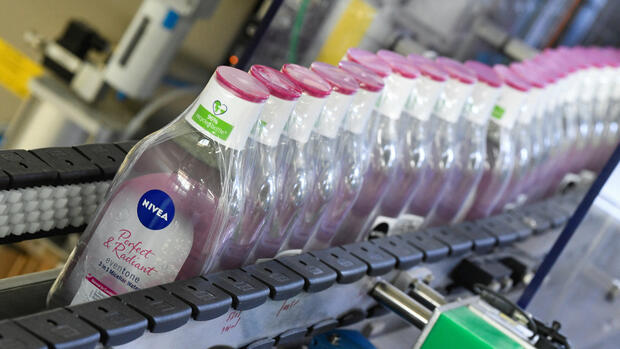Dusseldorf Despite higher sales and profits, Nivea manufacturer Beiersdorf no longer wants to pay dividends. This caused harsh criticism from investors at the virtual general meeting on Thursday. “How well does business have to go before the dividend can be increased?” asked a shareholder representative. The company was just hoarding its money, another shareholder said.
The consumer goods group is developing positively against the industry trend. Unlike many of its competitors, Beiersdorf recently sold more products despite price increases. In the past year, the Dax group increased sales from its own resources by 10.2 percent to 8.8 billion euros.
Although costs increased by 20 percent, the company managed to improve its profit – by 17 percent to a record 1.16 billion euros. The start of the current year also went better than expected. Nevertheless, the dividend has remained at just 70 cents per share for more than ten years.
Beiersdorf boss Warnery promises shareholders improvement
CEO Vincent Warnery asserted on Thursday that he wanted to tackle the issue. He is now faced with his fourth task since taking office, namely “making better use of Beiersdorf’s financial resources”.
The committees would regularly discuss other uses of the capital, including “the amount of dividends to be distributed,” Warnery said. Apparently the owners, the Herz family, are reticent about the subject. You own a large part of the shares through Maxinvest Holding.
Warnery has been working on accelerating growth, improving profitability and making acquisitions since its launch in May 2021. Under the leadership of the French, the group has developed better than it has in a long time. In the past year, no share in the Dax grew as strongly as that of the Nivea manufacturer. For the first time in 20 years, Beiersdorf recorded double-digit organic sales growth.
Especially with its core brand Nivea, which accounts for the bulk of sales, Beiersdorf relies on fewer but higher-margin products such as face care creams. This area is considered a growth market.
Under the leadership of the French, the group has developed better than it has in a long time.
At the same time, outside of Germany, the Group no longer focuses on segments in which competitors dominate the market, such as hair care. The group also wants to close geographical gaps and is expanding to China, for example, because the demand for care products is particularly high there.
Warnery announced plans to expand activities in China, particularly with the luxury brand La Prairie. So far, Beiersdorf has achieved a high single-digit share of sales there.
“We have too much money, that’s true”
“We have the right strategy,” Warnery said. In the past one was dependent on the Nivea business in Germany and on La Prairie. Nivea is now also increasing its sales in growth markets, and is also having success with other skin care products. “The two-wheel drive became a four-wheel drive,” says the Frenchman.
Beiersdorf sits on cash of over four billion euros. “We have too much money, that’s true,” admitted the chairman of the supervisory board, Reinhard Pöllath, after criticism from shareholders. The group had not made any acquisitions for a long time. Most recently, there were smaller acquisitions with the purchase of the US sunscreen brand Coppertone and the luxury care brand Chantecaille.
Beiersdorf mainly invested his money in securities in order to be able to use it at short notice for possible acquisitions, explained CFO Astrid Hermann. The return on the money invested is around 0.5 percent per year.
The shareholders also complained that the Annual General Meeting was again only held virtually after the end of the corona restrictions. Only twelve of the 40 Dax companies are inviting you to a face-to-face meeting again this year. “Our positive basic attitude towards the virtual general meeting does not mean that there will be no face-to-face meetings in the future,” said CEO Warnery.
One thing is clear: Beiersdorf can save money with the virtual format. CFO Hermann put the cost of this year’s event at around 560,000 euros. The last face-to-face meeting for the time being cost 885,000 euros.
No more Nivea creams at Aldi
Currently, customers will not find any Nivea creams at Aldi. The “Lebensmittelzeitung” reported on Tuesday that Aldi had discontinued Beiersdorf’s products in order to strengthen its own brands. The discounter has relied on the Nivea brand since 2013.
“It is correct that no Beiersdorf products are currently being sold at Aldi,” said the head of the cosmetics business, Oswald Barckhahn, on Thursday. But there is no permanent delisting. The statement indicates that Aldi and Beiersdorf are crossed in price negotiations. Other brands and supermarkets such as Mars and Edeka also temporarily stopped delivery in the struggle for higher prices.
More: Dispute between supermarket giant Edeka and Mars escalates.
